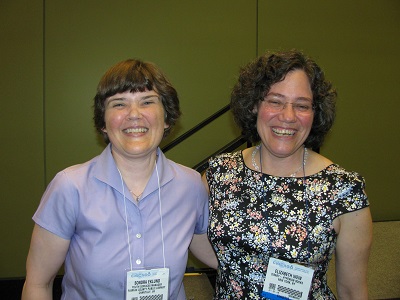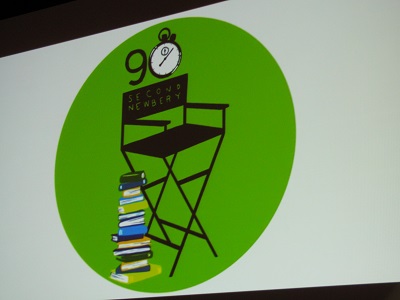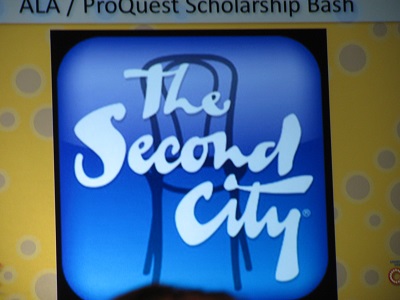ALA 2013 – Saturday – Programs and Ideas and Authors, Oh My!
This is Part 4 of my summing up of the 2013 ALA Annual Conference. I’m up to Saturday, a day of some inspiring programs full of ideas I’d like to try.
The day got off to an inauspicious start. I had carefully set the hotel alarm clock the night before. In the morning, I laid awake on the bed with my blindfold in place quite awhile, wondering why I’d woken so early. Finally, I looked at the clock and discovered it wasn’t so early after all. Though I’d set the alarm, I hadn’t actually turned it on. So I didn’t get to the convention center in time for the Collection Management session I’d planned to attend. However, it turned out I was right on time to attend the Scholastic Book Buzz.
I’ve actually started trying to avoid the Book Buzz sessions — it just tells me about more books I want to read. But I still enjoy them. It’s fun to then go to the booth and ask for specific titles you saw in the program. For example, one that caught my eye was Marie Antoinette, Serial Killer, by Katie Alender. The premise simply makes me laugh — a modern-day teen in Paris discovers that Marie Antoinette’s ghost is haunting the city — and she’s angry. It makes sense. After all, wouldn’t she be angry?
Next was a tough choice. I’d wanted to go hear Naomi Novik speak on a panel titled “Beyond Genre.” But I decided that more practical to my job would be a session put together by Cen Campbell, who’s served with me on ALSC’s Children and Technology committee, and who is doing amazing things. The session was called “Building A to Zoo for Apps,” and is about the need for App Advisory, and how that’s exactly something librarians are good at and should be doing.
She had assembled a stellar panel of speakers. Clarissa Kruger writes a blog that reviews apps. She started as a mom who saw a gap. Parents are looking for ebooks and they need help. Other speakers talked about how librarians should get involved reviewing apps, and identify themselves as librarians when they do so (Sneaky outreach!).
An especially inspiring speaker was Chip Donohue from the Fred Rogers Center. He said that the new tools hold wonderful potential for promoting relationships and interaction.
“The tablet is an invitation.”
“We have a wonderful opportunity to model appropriate use of this tool.”
He said that we should avoid the false dichotomy of ALL tech or NO tech. It CAN be both! “Young children do not segment their thinking.”
“How can these tools become tools for literacy and engagement?”
“Parents are dying for help selecting apps.”
“Work on your own digital literacy.”
“Select. Use. Integrate. Evaluate.”
“It’s what we’ve always done. We know how to do this.”
“Fred Rogers believed that technology is okay and can be great if it’s used to build relationships, interactions, and social-emotional development.”
Some responses during the Question and Answer session:
“This new technology is NOT ‘better.’ It’s a new tool added.”
“The tools ARE in the kids’ hands. Let’s use them.”
We need to be the researchers. Edtech research lags 10 years behind technology.
When we use apps in storytime, we’re modeling using them in an educational way.
And the final rallying cry:
“We need to build an army to curate this new marketplace.”
Okay, after that program, I went to an “Ignite!” program, where 6 people spoke on different topics for 5 minutes each. These were interesting, and the presenters really pared down their talks so you got the nugget of what they had to say quickly. They were extremely varied ideas. Some helpful ones:
It’s important to build a professional learning network. Be prosumers (producers) as well as consumers.
Shanna Miles talked about “PTSD and the Urban School Library” – Kids need reflective texts, books where they see themselves.
Do characters speak, act, look, experience life like these kids?
Do the books provide solutions and give hope?
If they can live it, they can read it.
Kim Ventrella, from my own library system, did a presentation on “Book Snacks: Teen Humor Edition.” She showed how you can make “booktweets” promoting a book in 140 characters or less. You can use this idea on bookmarks, book displays, and more.
Jennifer Lau-Bond talked about Creativity in Reference Service Provision.
She described “Predatory Reference” — What questions aren’t people asking? Go answer them!
Had “Librarians on the Loose” at a train station.
Monitor local social media questions.
Where does your community go online? How can you contribute?
After that interesting session, I got lunch and explored the exhibits some more. Then I walked in a little late to the panel “Science Fiction: The Factual and the Counterfactual.” I’ve gone to this session most years at ALA, and I love what the authors have to say about the state of science fiction and fantasy. I’ll list some good quotations:
David Brin:
“We create industrial grade magic of incantations.”
“Science fiction takes these incantations and expands them.”
“Get back to the heart of science fiction: Optimism.”
“Can we get people to think it’s possible to leave people with the belief we might make it?”
John Scalzi:
“Given enough time, anything in science fiction is eventually proven wrong.
Why this does not matter: It’s about the larger themes.
“Science fiction misses the small details but gets the larger picture right.”
“DO get the stuff we know right. But don’t worry about the rest.”
“It’s about positing what these things will do to us as humans.”
Elizabeth Bear:
“I grew up in a library.” The only child of a single parent, she was there every day for 3 hours.
Today there’s big diversity in YA science fiction fans and writers.
“The Rainbow Age of Science Fiction” – This is the factual world. It’s diverse.
The job of science fiction writers isn’t futurism.
“The best science fiction is always about the present.”
It extrapolates and examines.
You don’t have to use metaphor. You can tackle issues thematically without oversimplification and didacticism.
“In good characters, specificity becomes general.”
“Provide that right environment for young readers so they can figure out what they think about the world.”
Brandon Sanderson:
As a kid, he was often told to “be realistic.” What does that even mean? Approximate reality?
“In fantasy, the world was so different, that makes the person [the main character] my tribe. This was the familiar among the strange.”
“It makes the strange familiar and adds a new level of strange.”
“It made being a fantasy novelist realistic by comparison.”
“I’m not trying to be a wizard! I just want to write books!”
“We’re giving books to the people who will define what realistic means in 40 years.”
Cory Doctorow:
He doesn’t think science fiction is extrapolative. It’s more like a petri dish.
“We predict the present by doing a world-in-a-bottle-exercise.”
“Knowing about the present is necessary but insufficient to knowing about the future.”
“We only experience one person’s interiority, our own. Yet books are about interiority.”
“The amazing thing about literature: The sustained illusion that we can share in someone else’s experience of the world.”
They gave a bag of books to everyone who attended the panel, but unfortunately, I didn’t have time to stand in line to get them signed. I wanted to go to:
Conversation Starter: 90-Second Newbery Film Festival
My friend (by now) James Kennedy was running this program. He talked about the 90-second Newbery Film Festival, now in its 3rd year. He showed lots of brilliant examples, created by kids. The premise is to show the entire story of a Newbery winner or honor book in 90 seconds.
“Any book becomes hilarious when compressed to 90 seconds.”
“Kids take control, and they have to know the text really well.”
Much of the creativity comes in when they put the text in another movie style.
“What kids want is recognition.”
“There’s a lot you can do with very limited resources.”
“It takes real engagement with the text to boil down the script to 90 seconds.”
“Teaches kids about a long-term project and digital literacy.”
“Genre-bending takes some smarts.”
There is a curriculum guide at 90secondnewbery.com
Some advice for public libraries: Try using puppets in case the same people don’t show up at later meetings.
I’d really like to get this going at my library. Not quite sure how to start rounding up a group of interested kids, but the ideas are percolating….
After that, I hit the exhibits again, shipped the day’s books, and then went to hear Elizabeth Wein speak at a session sponsored by USBBY.
She’s an appropriate speaker for USBBY, a branch of IBBY, an international organization of books for youth, since she has lived in many different countries.
She talked about her childhood. She was born in America, but lived as a child in the United Kingdom, and then in Jamaica. She didn’t come back to America until she was 9 years old.
She showed us some old pictures and some of her writing and drawing as a child. We saw some themes that came up in Code Name Verity!
She migrates like the osprey — not immigrating, but having a home in different places.
“Moving around created a strong sense of nostalgia early on.”
She longed for a sense of place and a place to be rooted.
She spends her life collecting places she loves.
Living in Jamaica, she was international and colorblind in her early reading, including reading English translations of Chinese propaganda picture books.
She wrote Sara Crewe and Alan Garner fan fiction.
“Passenger air travel has made our world smaller and brought us closer together.”
“Best we can ask: Open minds and no fear of strangers.”
I was especially excited to meet Elizabeth at the end of the session. (That’s the picture at the top of this post.) I was happy that she knows my name. I’ve been reviewing (and loving) her books for 10 years! It turns out that the first book I read of hers, A Coalition of Lions was my #1 2003 Sonderbooks Stand-out in Historical Fiction. (Back then, there weren’t so many bloggers, so I even talked to her via e-mail a little bit.) And I’ve continued to love her books over the years.
After that, it was back to the hotel. I grabbed some dinner, and then went to the ALA/ProQuest Scholarship Blast where Second City was performing comedy and improv. I was curious about them ever since listening to Tina Fey’s book, Bossypants.
It was very funny. I don’t think I’ll probably go to this event in future years unless I find a friend to go with. At the Newbery Banquet and Printz Awards, I always run into several people I know — They’re for the children’s and YA book people. At this, I saw one person I knew, but I think he was on a date. Still, it was nice to not think and just laugh.
And that was my big Saturday! More ALA coverage will follow — Writing up helps me consolidate in my mind all I learned and experienced. Sunday was one of the highlights of the conference — The Newbery-Caldecott-Wilder Banquet. I took lots of pictures of people dressed up in honor of the Caldecott’s 75th anniversary. Coverage coming soon!


